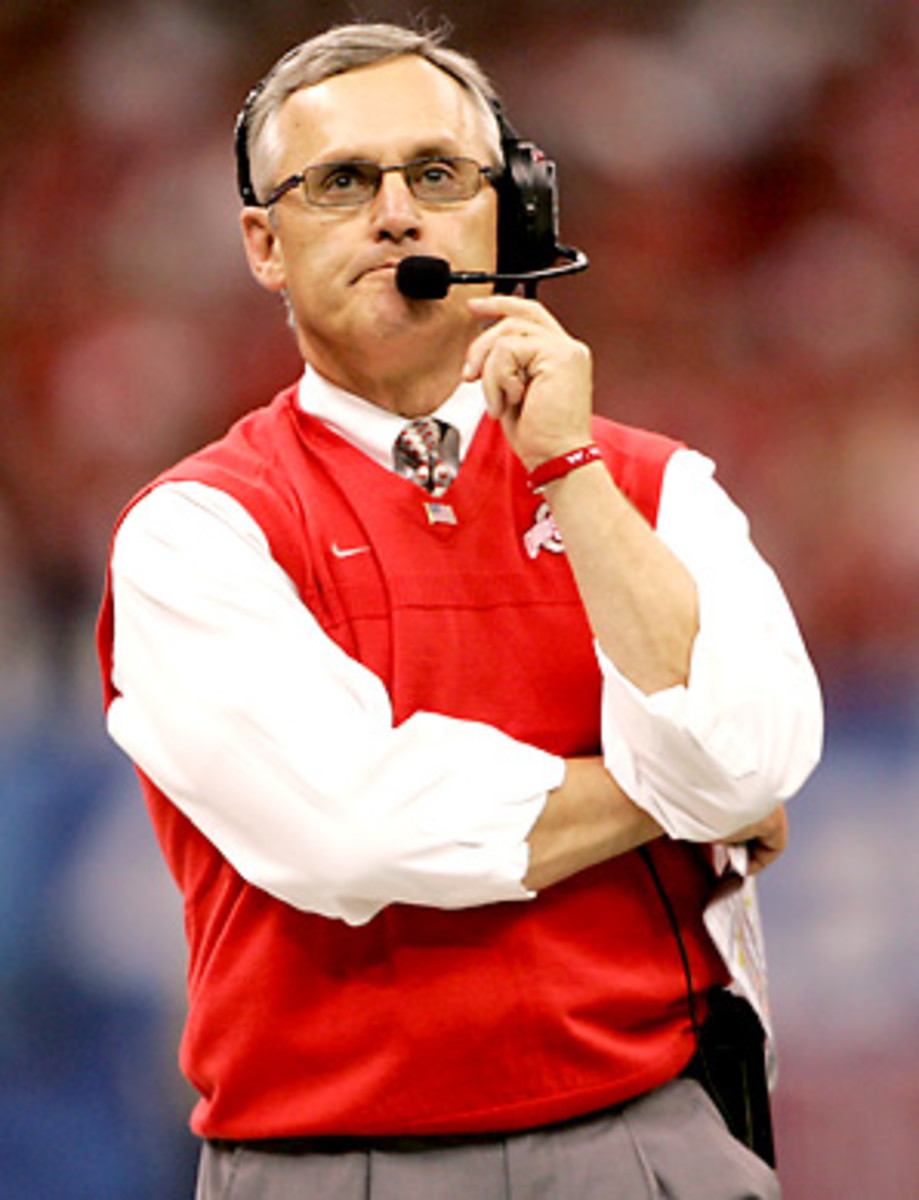Worst part of Tressel's NCAA saga? Discovering he's just like us


The Jim Tressel situation has left the state of Ohio in a state of disappointment. Buckeye fans are sad and incredulous that their sweater-vested man of self-proclaimed virtue could turn out to be so similar to the rest of us.
The Ohio State football coach lied to the NCAA and to his employer when he claimed not to know his players were trading memorabilia for tattoos. Somehow, the author of two how-to-be-a-winner books -- including one subtitled Promises From God on Achieving Your Best -- has fallen short of sainthood.
Tressel is just a man. A man with an .828 winning percentage at OSU, sure. A man whose club hasn't lost to Michigan in 2,714 days, according to the tally updated daily on the Columbus Dispatch website. A man who has done a fine job getting the Buckeyes into the BCS bowl mix on a regular basis. But a man, just the same.
His ability to diagram plays doesn't come with a bent toward moral perfection. Even as Tressel tried to make it seem that way. Even as the Buck nuts lapped it up with a spoon.
I noted in a column in the Cincinnati Enquirer this week that to the part of the country that does not include Columbus, Ohio, Tressel is the Wizard of Oz. No longer great and powerful. Just a vested guy behind a curtain, with a vested interest in keeping his football machine fed.
That provoked a deluge of indignant response from the OSU football faithful, who can be as blind as the blindest SEC acolyte. "It's funny,'' one fan wrote. "We want to hold football coaches to higher standards than we do our presidents.''
He could have a point.
George Bush told us about weapons of mass destruction in Iraq. His father asked us to read his lips. Bill Clinton said he didn't have sex with that woman. Richard Nixon said he wasn't a crook.
Well, um, ah, as a matter of fact, Mr. President...
We remember these things. They might even anger us. They don't surprise us, though. They don't disappoint us. We assume politicians are liars. We long ago passed wary and cynical on the road to numb. On the campaign trail, the difference between a "lie'' and a "promise" is the individual voter's capacity for charity. We don't hold politicians accountable for their untruths because we don't have the time.
When considering politicians, it's not unhealthy to abide by this motto: Expect the worst and you'll never be disappointed. Yet when a football coach lies to the NCAA and to his employer, we break out in a cold fret.
Sports are different. We invest emotion in them. We give of ourselves. We want to believe Our Guys are the Good Guys. Until beating Arkansas in the Sugar Bowl in January, Ohio State football had been plundered routinely by SEC teams in the last decade. Buckeye fans soothed themselves with the myth that their Guys were a cut above.
We didn't win, but we have class.
Now what?
Truth is, Tressel doesn't earn $3.5 million a year to write how-to books on being virtuous. He isn't paid three times more than university president E. Gordon Gee -- who is the highest paid public university president in the country -- to be a pitchman for decency.
And while he did craft an image of small-town niceness under the biggest quasi-amateur big top in the country -- look, I even have our fight song on my car CD changer! -- Tressel was not immune to the pressures inherent in his work. Or to the hubris prompted by universal idolatry.
If you want a reason Tressel lied to the NCAA and Ohio State about eligibility issues and potential rules violations, maybe it's this: He did it because he could. He believed he was doing the right thing -- protecting his players, he said -- for the right reason. After all, he's Jim Tressel.
It's charming, even endearing, that we keep holding our sports gods to a higher standard than they deserve. The people who play and coach big-time college and pro sports are not role models, generally. Many of them need role models.
What's most distressing about Tressel's behavior isn't that he lied. It's that he pretended. Politicians pretend. I've never spent any time with a politician and come away feeling I knew him. He was who he wanted me to believe he was.
I have spent enough time with some coaches and athletes to have a sense of who they really are. Tressel isn't among them. But I'm guessing lots of fans who feel duped today are people who thought they knew Tressel. In that sense, an honest scoundrel is preferable to a dishonest charlatan.
In Ohio, we're not mad at Tressel the way we might be with the governor, or the state rep who ran on a pro-education platform, then voted to cut back benefits for teachers. We're disappointed in Tressel, though. We thought he was a true wizard.
We didn't think he'd behave like the rest of us. Not until he did.
